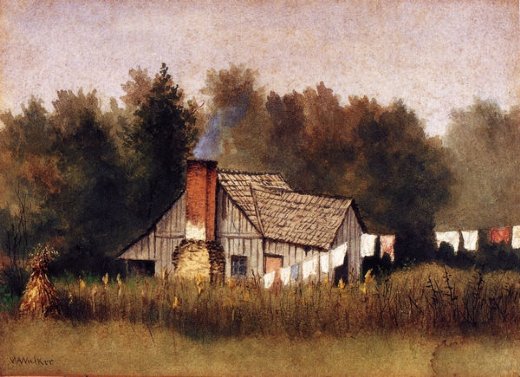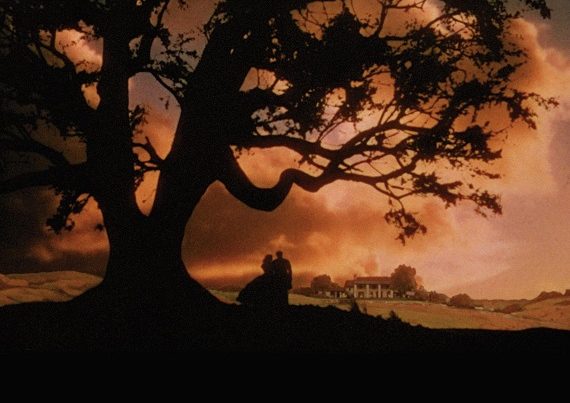Reprinted from The Deliberate Agrarian.
We are not called to be slaves.
I happen to think that how and where we live our lives and raise our families can make an enormous difference in how strong and vibrant our families will be. That seems like a self-evident statement. What might not be self-evident is that God’s ideal plan for families is for them to live on a section of productive land, and to establish family economies.
I’m sure that a lot of Christians will disagree with that last sentence. That’s because, for one thing, so few modern Christians live that way. Besides that, I don’t suppose anyone has ever heard a sermon preached on the biblical imperative of establishing family economies on the land. Pretty much nobody is talking about this. It’s virtually unheard of. There is a much larger focus in the modern evangelical church on “cheap grace,” not multi-generational obedience to biblical imperatives.
Well, it wouldn’t be the first time in history that a biblical imperative was lost and unknown to God’s people. This brings to mind the Jewish King, Josiah, in the Old Testament. Josiah decided to renovate the temple. A lost scroll was uncovered in the process. It was the “law of the LORD.”
It’s hard to feature how God’s law, as given to Moses, could be totally lost and forgotten in an ancient Jewish Kingdom, but that’s what happened.
King Josiah read the document and realized that his kingdom had strayed far from God’s law. Josiah was a man who feared God, and he realized the kingdom would suffer God’s judgment. So what did Josiah do? 2 Kings 23 tells the story…
…[T]he king went up into the house of the Lord, and all the men of Judah and all the inhabitants of Jerusalem with him, and the priests, and the prophets, and all the people, both small and great: and he read in their ears all the words of the book of the covenant which was found in the house of the Lord.
And the king stood by a pillar, and made a covenant before the Lord, to walk after the Lord, and to keep his commandments and his testimonies and his statutes with all their heart and all their soul, to perform the words of this covenant that were written in this book. And all the people stood to the covenant.
Then Josiah ordered that all the pagan altars and idols and priests be destroyed. He purged his kingdom of all idolatry. That’s the fear of God in action.
It’s a story worth reading and thinking about because all Christians should be like King Josiah in the “kingdom” of their own lives. But I digress. I want to return to this matter of the family economy. Keep reading and decide for yourself if what I’m trying to communicate rings true or not. I’m going to approach this in a roundabout way, beginning with the apostle Paul, in 1 Corinthians 7:23 …
Ye are bought with a price; be not ye the servants of men.
In the above verse (and verse 21 before it), Paul says that it is best for Christians not to be servants to other men. Servant is another word for slave. What exactly is a slave or a servant?
A slave (or a servant) can be defined as someone who is told by a master what to do with their time and labor. Furthermore, the master also determines what amount a slave or servant is to be paid for his (or her) labor. In other words, a slave or servant does not decide for himself how he will spend his time, what he will work at, and what the return for his work will be.
Furthermore, a slave or a servant is someone who works to advance the goals and visions of other men.
Thus it is that any man who works for a modern corporation, the government, or any small business is a slave or servant. Yes, it is voluntary slavery, but slavery nonetheless. Most people who are employed by anyone other than themselves know that their work is a type of slavery.
Now, I need to make it clear that Paul says some men are called to be servants, and that they should be content in that, because, ultimately, they are the “Lord’s freeman.” But if they can be free, God’s people should be free.
When the nation of Israel was enslaved in Egypt, they cried out to God to free them from the bondage. If slavery is the best kind of lifestyle for God’s people to be in, God would have just left the Jewish nation in Egypt. But He heard their prayers and gave them their freedom.
However, once they had their freedom, the Jews longed for enslavement again…
We remember the fish, which we did eat in Egypt freely: the cucumbers, and the melons, and the leeks, and the onions, and the garlic.
It so happens that freedom comes with a price tag of hardship (often harder than being a slave) and responsibility (much more than slavery requires).
Once the nation of Israel got over their fondness for slavery and trusted God to take them into a better place (of freedom), He did exactly that. And in the promised land God took them to, every family had a section of land to exercise their freedom and dominion. In Kings 4:25 we read…
Judah and Israel dwelt safely, every man under his vine and under his fig tree.
In other words, every man (with his family) were on a section of land, husbanding the land, making it fruitful and productive. They lived and worked close to, and dependent upon, the source of all prosperity—the land. The economic productivity of the nation was not in factories and enormous industrial farms. It was in individual families. And these people were free— as free as earthly men can be.
This decentralized, agrarian paradigm for life—family economies on the land—was God’s ideal for His people.
Another evidence that God does not like to see his people in slavery or servitude is the Jubilee found in Leviticus 25. It was not uncommon for some Jewish people to lose their land and go into servitude as a result of poverty and/or unpaid debt. You borrow money from me, and you can’t pay me back, then you become my slave. That’s a simplification, but it is, essentially, the way it worked. But according to God’s instruction, every 50 years, on the Jubilee, enslaved Jews were given their freedom. More than that, any land that was lost or sold in the previous 50 years was returned. In addition to God’s feelings about slavery, we can see a clear connection between the ownership of land and freedom in the Jubilee.
Elsewhere in the Bible, Christians are warned to avoid debt. Proverbs 22:7 says that a borrower is a slave to the lender. Debt and slavery are synonymous. Debt is clearly not a good or desirable thing, and neither is slavery.
When we look at early American history, we see a nation that was much like the promised land of Old Testament Israel. We were an agrarian nation. Men did not leave their land to go work in factories. The center of economic activity in early America was the many families living on the land, deriving their sustenance from it. Then came industrialization with its factories and centralized production.
Believe it or not, factories were once not allowed in America. We were a deliberate agrarian colony of England. The factories came after we gained independence. But they didn’t come right away. There was resistance to the industrialization of this country. Thomas Jefferson, John Adams, James Madison, Benjamin Franklin and other lesser known founders of the nation were against the introduction of a factory economy.
Jefferson and Adams had toured the farms and cities of England together after the Revolution when they were there to try and work out a trade treaty. They saw firsthand how the industrial economy in that country adversely affected the people and the traditional culture. They identified industrialism as a danger to the American Republic.
But industrialization came and it brought the destruction of the agrarian-based family economies of this nation. The fabric of life that once knit families together was torn asunder as fathers left the home to work in factories and cities. Then, in the aftermath of two World Wars, mothers left to join the industrial workforce too. Marriage was no longer, as Allan Carlson puts it, “a union of the sexual and the economic,” (see below) and children became economic liabilites instead of cherished assets in the family economy.
Thus we see that, as dependence on the industrial systems increased, and the family economy has become a threadbare relic, few families today experience the fullness of family life as it once was—as God designed it to be. Also, with the rise of industrialism has come an alarming increase in apostasy and the widespread decline of Christian culture. These are the most wicked fruits of industrialism.
Industrialism, and it’s spawn (e.g., corporate capitalism and statism), needs to be recognized for what it is— a primary tool for the destruction of Christian culture, and the enslavement of mankind.
Once this is clearly seen and understood, individual Christians, and Christian families, face a profound choice. Do they continue to live a life of servitude to, and dependency upon, the industrial masters? Do they continue to conform to the industrial expectations? Do they willingly hand their children over to be indoctrinated in the ways of industrialism? Or do they carefully, deliberately take steps to free themselves from the industrial matrix?
Yes, you can (and may have to) be the Lord’s freeman while living as a servant to wicked industrialsim. But I am inclined to believe that there is great wisdom in the words of the apostle Paul:
Be ye not the servants of men.
========
Before the rise of modern industry… virtually the whole of humankind lived in family-centered economies. The family was the locus of the most productive activity, whether it be on largely self-sufficient farms or in small family shops… Husbands and wives relied on each other, shared with each other, so their small family enterprises might succeed. They specialized in their daily tasks, according to their respective skills. Marriage was still true to its historic definition: a union of the sexual and the economic.
—Allan C. Carlson, Ph.D.
From the book, Love is Not Enough







